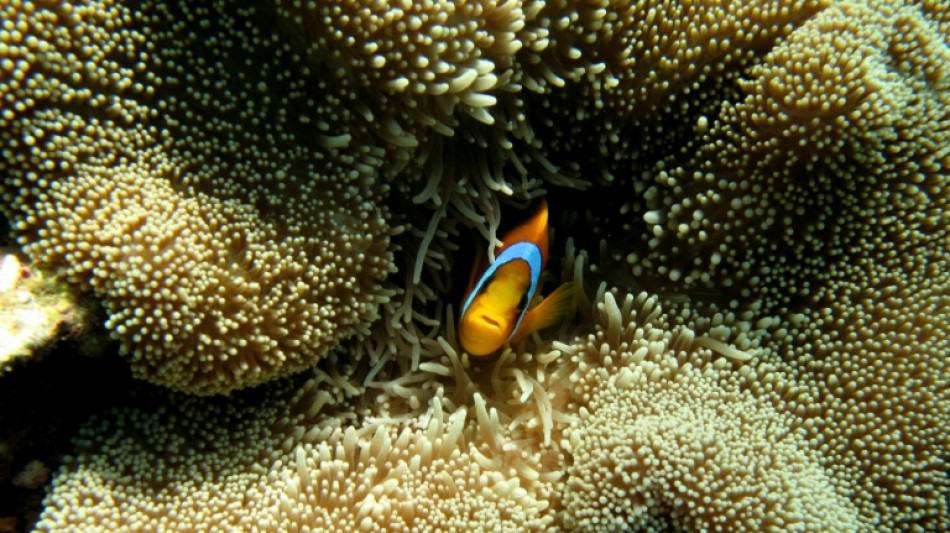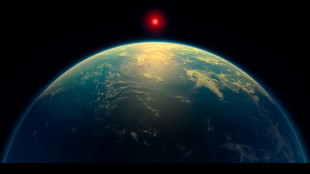
-
 Migrant's expulsion puts Washington Salvadorans on edge
Migrant's expulsion puts Washington Salvadorans on edge
-
Plan for expanded Muslim community triggers hope, fear in Texas

-
 Pakistan foreign minister due in Kabul as deportations rise
Pakistan foreign minister due in Kabul as deportations rise
-
White House touts Covid-19 'lab leak' theory on revamped site

-
 Dodgers star Ohtani skips trip to Texas to await birth of first child
Dodgers star Ohtani skips trip to Texas to await birth of first child
-
US senator says El Salvador staged 'margarita' photo op

-
 Ford 'adjusts' some exports to China due to tariffs
Ford 'adjusts' some exports to China due to tariffs
-
Thomas maintains two-shot lead at RBC Heritage

-
 US to withdraw some 1,000 troops from Syria
US to withdraw some 1,000 troops from Syria
-
Four killed after spring storms wreak havoc in the Alps

-
 Spurs' Popovich reportedly home and well after 'medical incident'
Spurs' Popovich reportedly home and well after 'medical incident'
-
Trump goes to war with the Fed

-
 Celtics chase second straight NBA title in playoff field led by Thunder, Cavs
Celtics chase second straight NBA title in playoff field led by Thunder, Cavs
-
White House site blames China for Covid-19 'lab leak'

-
 Norris edges Piastri as McLaren top Jeddah practice
Norris edges Piastri as McLaren top Jeddah practice
-
Trump warns US could ditch Ukraine talks if no progress

-
 Judge denies Sean 'Diddy' Combs push to delay trial
Judge denies Sean 'Diddy' Combs push to delay trial
-
80 killed in deadliest US attack on Yemen, Huthis say

-
 Lebanon says two killed in Israeli strikes in south
Lebanon says two killed in Israeli strikes in south
-
Trump says US will soon 'take a pass' if no Ukraine deal

-
 F1 success is 'like cooking' - Ferrari head chef Vasseur
F1 success is 'like cooking' - Ferrari head chef Vasseur
-
Cycling mulls slowing bikes to make road racing safer

-
 Macron invites foreign researchers to 'choose France'
Macron invites foreign researchers to 'choose France'
-
Klopp 'happy' in new job despite Real Madrid rumours: agent

-
 Alcaraz into Barcelona semis as defending champion Ruud exits
Alcaraz into Barcelona semis as defending champion Ruud exits
-
Vance meets Italy's Meloni before Easter at the Vatican

-
 Evenepoel returns with victory in Brabantse Pijl
Evenepoel returns with victory in Brabantse Pijl
-
Maresca confident he will survive Chelsea slump

-
 Mob beats to death man from persecuted Pakistan minority
Mob beats to death man from persecuted Pakistan minority
-
Lebanon says one killed in Israeli strike near Sidon

-
 Arsenal's Havertz could return for Champions League final
Arsenal's Havertz could return for Champions League final
-
US officials split on Ukraine truce prospects

-
 Client brain-dead after Paris cryotherapy session goes wrong
Client brain-dead after Paris cryotherapy session goes wrong
-
Flick demands answers from La Liga for 'joke' schedule

-
 'Maddest game' sums up Man Utd career for Maguire
'Maddest game' sums up Man Utd career for Maguire
-
Trial opens for students, journalists over Istanbul protests

-
 Gaza rescuers say Israeli strikes kill 24 after Hamas rejects truce proposal
Gaza rescuers say Israeli strikes kill 24 after Hamas rejects truce proposal
-
'Really stuck': Ukraine's EU accession drive stumbles

-
 'Not the time to discuss future', says Alonso amid Real Madrid links
'Not the time to discuss future', says Alonso amid Real Madrid links
-
74 killed in deadliest US attack on Yemen, Huthis say

-
 Southgate's ex-assistant Holland fired by Japan's Yokohama
Southgate's ex-assistant Holland fired by Japan's Yokohama
-
Vance meets Meloni in Rome before Easter at the Vatican

-
 Ryan Gosling to star in new 'Star Wars' film
Ryan Gosling to star in new 'Star Wars' film
-
Hamas calls for pressure to end Israel's aid block on Gaza

-
 Russia says Ukraine energy truce over, US mulls peace talks exit
Russia says Ukraine energy truce over, US mulls peace talks exit
-
58 killed in deadliest US strike on Yemen, Huthis say

-
 Museums rethink how the Holocaust should be shown
Museums rethink how the Holocaust should be shown
-
Three dead after deadly spring storm wreaks havoc in the Alps

-
 No need for big changes at Liverpool, says Slot
No need for big changes at Liverpool, says Slot
-
Bloody Philippine passion play sees final performance of veteran 'Jesus'


From oil spills to new species: how tech reveals the ocean
The ocean covers nearly three-quarters of our planet but scientists say we have barely scratched the surface of what lives in our seas.
But new technologies are helping to change that, revealing hidden oil spills, speeding up the discovery of new species and uncovering how light pollution impacts marine life.
Uncovering hidden oil spills
Satellite imagery means large oil spills in the ocean are relatively easily detected. When a tanker crashes or a pipe bursts, scientists know where to look.
But smaller pollution events can appear as nothing more than a thin streak against the smooth sea surface -- the maritime equivalent of a needle in a haystack.
"It used to take human analysts weeks if not months to be able to detect a single (small-scale) oil pollution incident," explained Mitchelle De Leon of US-based NGO SkyTruth.
The group harnesses machine learning to comb through large datasets of satellite imagery and find spills that might previously have gone undetected.
SkyTruth has revealed spills in the Red Sea and the Mediterranean and helped expose pollution from shadowy Russian ships.
There are limitations to the technology, including determining the composition of a spill, but the group says it offers an early warning system for scientists, media and governments.
"We think of our tool as a starting point... to make hidden human pollution events more visible," said De Leon.
Understanding light pollution
We have long known that our obsession with lighting the night sky obscures the stars and confuses terrestrial animals, but what impact does it have on the sea?
To understand that, scientists need satellite images to show how light spreads from coastal megacities, as well as complex models that can calculate how light penetrates the ocean, said Tim Smyth, a marine biogeochemistry specialist at Britain's Plymouth Marine Laboratory.
Seawater generally absorbs more red light, but that can change in the presence of phytoplankton or high turbidity.
"We're able to programme computers such that we can model the light field under the water with a high degree of accuracy," said Smyth.
His research found two million square kilometres (770,000 square miles) of ocean -- an area 10 times the size of Britain -- is affected by light pollution globally.
The effects are profound, from disrupting feeding by fish and seabirds, to interfering with coral spawning and the nightly migrations of phytoplankton up and down the water column.
The good news is "it's something we can do something about", said Smyth.
Switching off unnecessary illuminations such as billboards and redesigning lights to reduce "spillage" into the sky will bring down costs and carbon emissions while benefitting wildlife on land and in the sea, he explained.
Species discovery
Advances in technology have allowed us to reach the ocean's darkest depths but scientists estimate we know about just 10 percent of what lives in our seas.
And before we even realise a new species exists, "we are losing that diversity", said Lucy Woodall, a marine biologist and head of science at Ocean Census.
Launched in 2023, the global alliance of scientists aims to speed up the discovery of ocean species from coral to crabs.
That works in part by collaborating with high-tech, lab-equipped research vessels where researchers can immediately start work on collected specimens.
Genetic sequencing can now be done in the field, "which even 10 years ago would have been months and months worth of work back on land", said Woodall.
On average, it takes more than 13 years from finding a possible new species to officially describing it for science.
"We can't afford to wait for that," said Woodall.
The project encourages scientists to share findings sooner, with an explanation of why they believe a species is new.
It won't replace the slower work of proving new species with methods such as genetic testing but it can accelerate knowledge at a time of urgency.
The project has documented more than 800 new discoveries, which are shared on its open-access biodiversity platform.
"We want to ensure that companies, countries, individuals really value the ocean and ocean life for what it does for them and our planet," said Woodall.
G.Frei--VB



